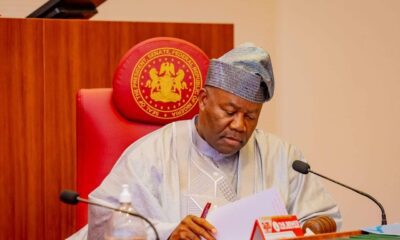Economic Issues
Why Nigeria Must Address its Soaring Debt Profile as the World continues to Fight a Global Pandemic -By Suliyat Dauda

There would not have been a best time to carefully discuss the impending doom in the Nigeria economy. Although the world is steadily moving to a total silence as major cities in the world face lockdown in the wake of the ravaging Coronavirus. Despite all the concocted rumour about its inactiveness in the immune system of Africans, the novel virus has finally crawl into the continent with virtually all commercial activities on hold.
Over these recent weeks, we totally shifted our focus from major issues affecting humanity to combat COVID-19, after all we have had a horrific journey over the past years, we will live to tell this tale too. From Lagos, Nigeria’s commercial capital where I write this piece from to Abuja the seat of power everyone (Government Officials, Political Office Holders, Businessmen, Policy makers, and Ordinary Citizens) is rallying forces together to win the war against the virus, however, we must also be disturbed over our soaring debt profile.
According to statistics, Nigeria might witness a significant historic expansion of debt given the dwindling oil prices, Coronavirus pandemic, partial devaluation of the currency and the 108% increase in debt from 12.6 trillion in 2015 to 26.2 trillion in the 3rd quarter of 2019.
from Baby Steps…
During the colonial rule, Nigeria’s first documented loan taken on her behalf by the British Colonial Masters came around 1923-1924, a figure within the region of £5.7 million with an interest rate of 2.5 percent per annum, payable over 20 years. By the end of 1936, Nigeria had taken a further loan of £4.89 million, bringing the country’s total public debt stock to about £9.89 million, which kept increasing to a toll of about $36 billion by 2005. As of 2005, the agreement was reached by the then government with Paris club to liquidate the nation’s external debt by 80%, reducing the country’s stock of debt drastically.
As of March 2015, the country was already oweing 12 trillion naira which slightly increased to 12.1 trillion in June 2015 at the official exchange rate of 196.95 naira to a dollar just one month after President Buhari took office by June 2018 the total debt had risen to #22.4 trillion and #25.7 trillion in June 2019 at the official exchange rate of #360 to a dollar.
Borrowing in the real sense is not bad, as it has always been the right way of financing projects for different developed and developing countries in the world to run its economy; however, the aim of the borrowing should be justified effectively and efficiently to stimulate growth. This could be explained from the DEBT-TO-GDP, DEBT-TO-REVENUE, and DEBT SERVICE -TO- REVENUE ratio.
leading the pack…
Nigeria debt to GDP is relatively low at about 30% compared to some other Sub Sahara African countries as South Africa’s ratio stood at 52.6%, Ghana at 71.8%, Kenya at 55.6% and Egypt as high as 103.3% while comparing with foreign countries USA debt to GDP is 105%, the UK at 85% and Canada at 90%.
However, the debt to GDP ratio isn’t the bone of contention rather the sustainability of the debt, which is the ratio of debt servicing to government revenue on the one hand and the ratio of government debt to government revenue on the other hand. Experts in the financial sector have it that while the debt-to-GDP rate might be sustainable now, the cost of servicing the debt takes a considerable chunk of the low revenue.
Also, World Bank prescribes debt service to revenue ratio of not more than 22.5%; Nigeria’s debt service to revenue ratio is at about 60%, which means for every revenue generated, 60% of it is used in servicing debt. The ratio is highest compared to other states with higher GDP-to- debt ratio as South Africa, Africa’s second largest economy maintains its debt with 13.7% of its revenue, Egypt, Ghana, and Kenya all servicing at 54.5%, 44.2% and 34.8% respectively.
Contained in the PWC report on (Nigeria economic alert, x-rating the 2020 FGN budget) Since 2011, debt servicing to revenue rose consistently from 21.2% to 51.9% in 2015 peaking at 86.6% in 2016. It declined after that to 78.6% and 67.7% in 2017 and 2018, respectively, which is above the 20-25% threshold. Should the debt service continue to increase, Nigeria will be in a debt trap.
According to Nairametrics, one of Nigeria’s leading business website, in mid 2015 alone, which was the beginning of the current administration Nigeria paid 378.9 billion naira to external debt service, fast forward to 2018, the sum of 1.47 billion was recorded while 1.31 billion was spent in 2019 which means foreign debt service payment alone rose by 245.9% between 2015 and 2019.
According to DMO’s report, Nigeria paid a total of 77 billion naira to service the country’s external debt between April and June 2019 while 189.9 billion was spent to service domestic debt which constitutes a total of 267.1 billion in 3 months.
At $57 per barrel of oil benchmarked for the 10.59 trillion 2020 budget, debt servicing will take 23.1 % of the total budget, constituting a whopping sum of 2.45 trillion in debt servicing. It is no news that President Buhari government planned to make an external loan of 22.79 billion naira from different bodies: 2.8 billion from World bank, 18.8 billion from AFDB, 1.1 billion naira Islamic Development Bank, German Development Bank and Japan International Cooperation Agency (JICA) 2 billion naira each. Also, 1.7 billion will be borrowed from China Exim Bank while the French Development Agency will also the adding to the list which the senate reportedly states will increase the Nigeria budget to whopping $33 trillion.
Undoubtedly, this will continue to grow debt servicing which external debt takes a massive chunk of it. Between January and February 2020, $4.55 billion has been paid to settle foreign debt represents the most significant single tranche of payment recorded in Nigeria history, and 14 years the debt has risen by 616% according to a report by Nairametrics.
Nigeria being a mono-cultural economy dependent on oil, with the dwindling oil price which is lower than $30 per barrel as opposed to the 57 dollar due to the Saudi-Arabia and Russia price war this has to shrink the already low revenue further as about 60% of the Nigeria revenue is gotten from crude oil. Recalling that the 2014 dwindled oil price has a root cause in that year’s economic recession.
fashioning a way out…
It is imperative to know that one of the primary reason for increasing debt servicing and high debt of in Africa’s biggest economy and acclaimed-giant of Africa is the low revenue-to-GDP of the country which currently stood at 8% compared to 29.1% in South Africa, its counterpart who they both make half of sub-Saharan Africa GDP.
Shrinking of spending wouldn’t help the situation slightly the federal government should reduce its over-reliance on crude oil and generate more revenue from its untapped revenue, refine its natural resources before being exported, judicious use its population (human capital development) and spend the loan more on capital expenditure rather than recurrent expenditure which have little or no yield in the long run.
Similarly, poor investment on the side of the government owing to unrealistic and unsustainable economic policies needs to be checked and curbed. And the government should answer the questions of WHAT. What will the debt be used for? What is the quality of the project and its cost to benefit? What is the productivity, efficiency, and effectiveness of the project?
Finally, the finance bill act passed as well as several monetary policies aimed at boosting the real sector of the economy and promoting the indigenous industry are right measures, however, the government in its own right needs to do more to take the country out the current economic turmoil she finds herself.
Now is time for significant action to the Mantra of diversification of the economy being sung for over two decades.
Suliyat Dauda writes from her Lagos home where she is currently self-isolating. She is an opinion writer and a budding investment banker with interest in tech. She can be reached through her email, daudasuliyatfunmilayo@gmail.com.


















